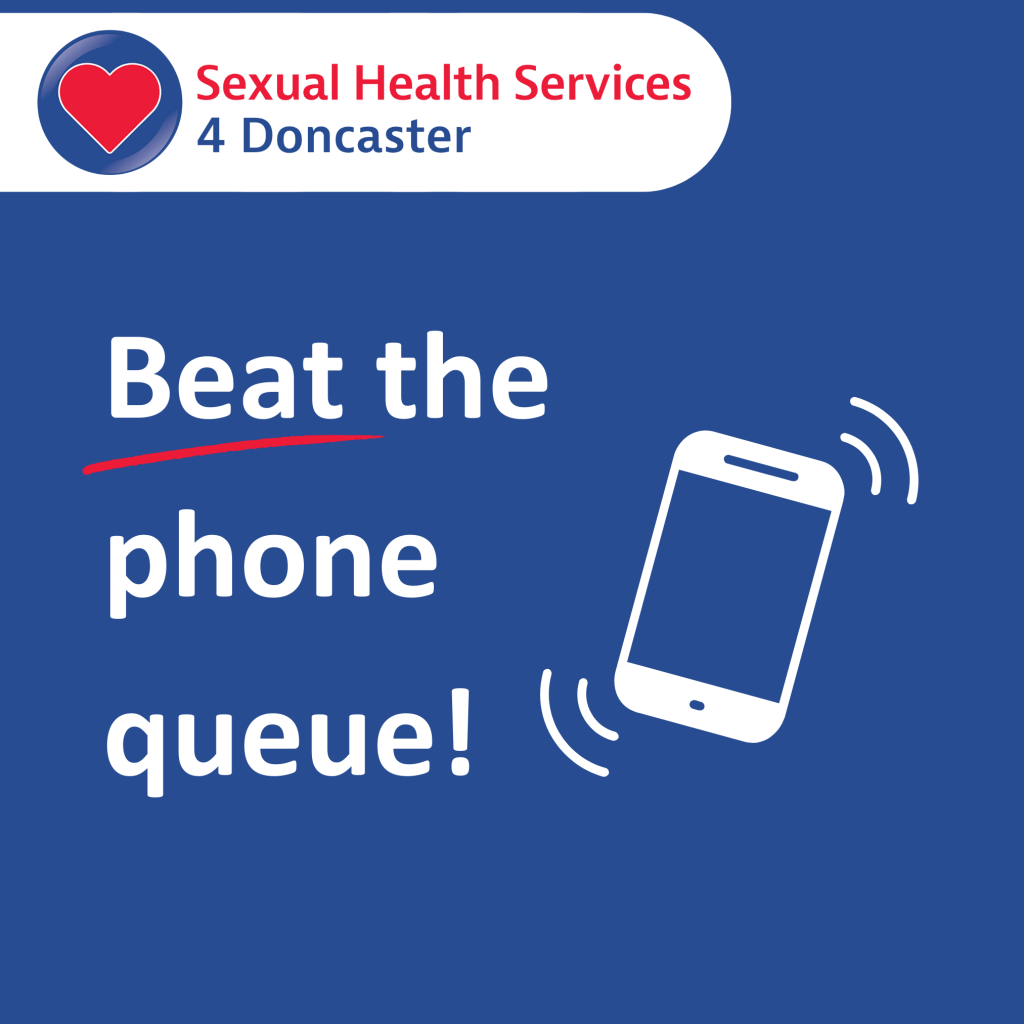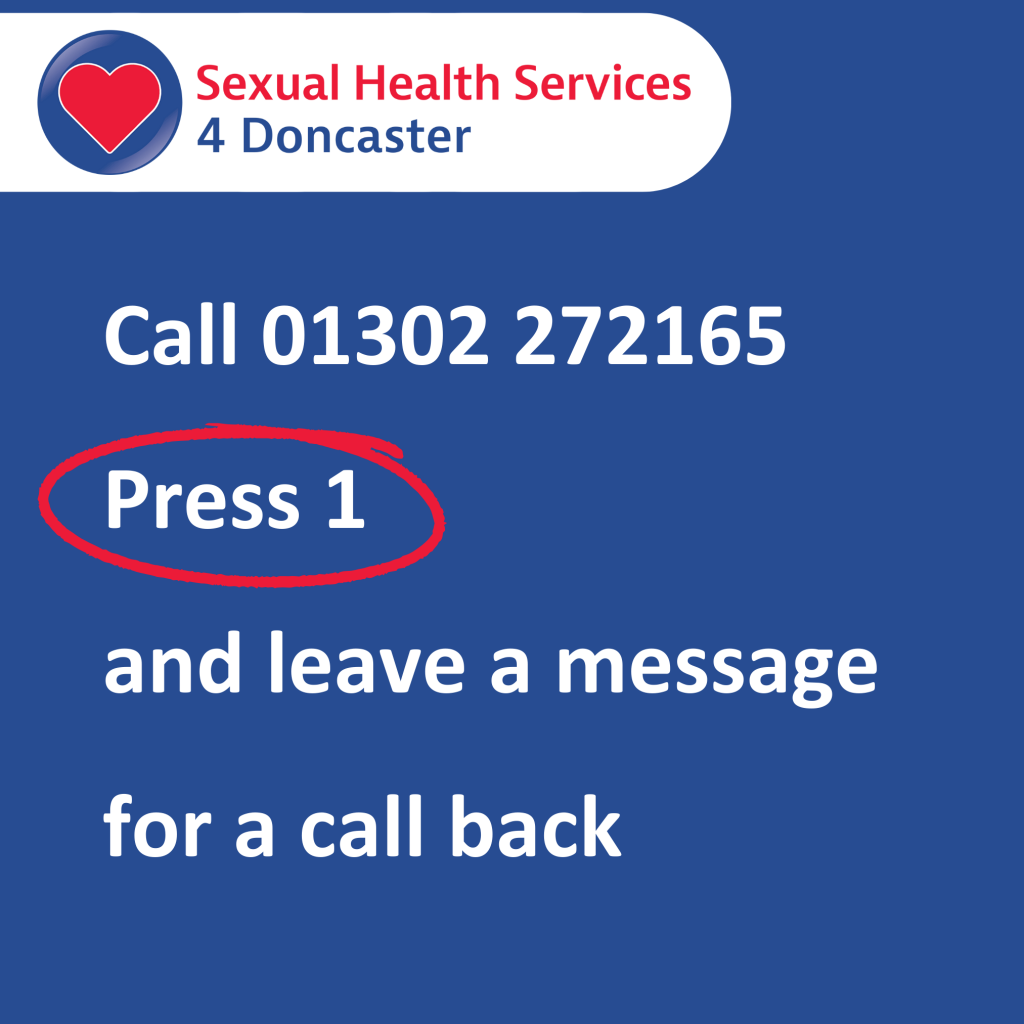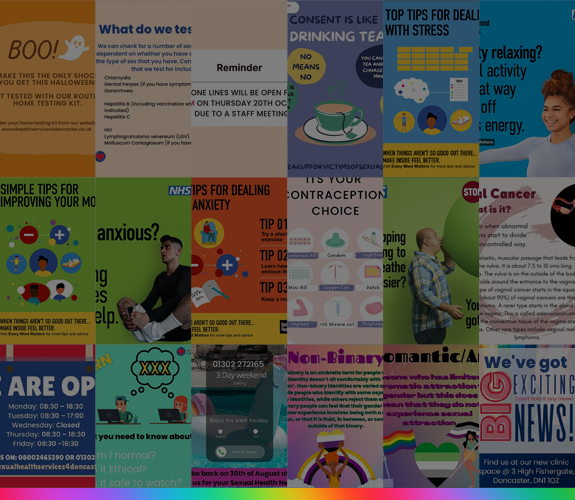

Sexual Health Services 4 Doncaster
3 High Fishergate
Doncaster, DN1 1QZ.
Landline: 01302 272165


Freephone: 08002465390
Email: sexualhealth.4doncaster@nhs.net
| Monday | 8.30 am – 6.30 pm |
| Tuesday | 8.30 am – 4.30 pm |
| Wednesday | Closed |
| Thursday | 8.30 am – 6.30 pm |
| Friday | 8.30 am – 4.30 pm |
| Saturday | Closed |

The service is closed on all National England Bank Holidays, Wednesdays and Weekends.
For urgent medical attention, please use 111.nhs.uk, or attend your local Emergency Department.
For Emergency Contraception, you can access a Pharmacy as outlined under ‘Emergency Contraception’
PEP can be obtained through your local Emergency Department.
Results Notifications
NEGATIVE RESULTS – 10 working days after testing patient will receive a text message confirming ALL results are negative
POSITIVE RESULTS – Patients will be contacted directly by a clinician to discuss results, treatments and further steps.
RECEPTION CANNOT GIVE ANY RESULT INFROMATION OVER THE PHONE.
Please contact us via this link: https://form.jotform.com/250502879300351
Fields with (*) are required.
For Emergency Contraception please call the service on 01302 272165 during opening hours.
Please contact us via this link: https://form.jotform.com/250502879300351
Your messages will be responded to within 3 working days, taking into account that the service is closed on Wednesdays, Saturdays and Sundays.
The Sexual Health Clinic is at 3 High Fisher Gate, Doncaster DN1 1QZ (next to Premier Inn).
You’ll usually meet with a doctor or nurse when you visit the clinic. They’ll start by looking at the information you provided on your registration form, so try to be as detailed as possible.
After that, they might ask you some personal questions. These can include things like why you came to the clinic, any health issues or symptoms you’re having, details about your recent sexual partners, and what kind of sex you’ve had.
Your clinician may also give you a physical examination if needed and suggest any necessary tests. Sometimes, they might recommend you see a health advisor. This is normal in certain situations:
Health advisors can also help you inform your partner(s) if they might be at risk of an infection and encourage them to get tested and treated.
It’s super important to answer these questions honestly because the tests or treatment you receive depend on your answers. If you’re not sure why they’re asking certain questions, don’t hesitate to ask your doctor, nurse, or health advisor to explain. They’re there to help and make sure you get the right care!
Confidentiality means keeping information safe and private. Our service will keep all your health information confidential. This includes: anything you tell us, any information we write down about you and details of any treatment you have had.
If you want to talk to us about something personal, we must keep this information confidential, even if you are under 16. This may be information about, sex, relationships, pregnancy, contraception, drugs and alcohol, or if you are feeling down.
You are entitled to the same confidential health care when you are under 18 as anyone over 18. If you are under 16 and having sex, you will be encouraged to talk with your parents, carers or guardians, but this does not mean that we will tell them about your visit.
Sometimes we may have to share information about you. We do this if we think you are at risk of serious harm or you are in danger. We may have to tell another health professional about it to be able to help you. But even then, we will tell you that we are going to do this and explain who we will tell and why. This is always done because we want to take care of your best interests.
We believe that young people need to be equipped with the knowledge and skills to develop sexual behavior that is safe and enjoyable for them and their sexual partners. Part of being safe is being in supportive relationships.
When they are healthy, relationships help us to thrive. As well as helping us enjoy the good times, they see us through the bad times too, holding us like a safety net when we’re at risk of falling.
Dating and new relationships should be exciting. We offer the following tips that might help you to build on the excitement and develop a healthy relationship with your partner.
Communication – it’s pretty obvious, but communication is really important in building healthy relationships. Are you on the same page in your relationship, do you understand each other’s expectations.
Disagreements – its OK; disagreements are a natural part of any relationship, but compromising and resolving disagreements fairly so that you both feel OK about it, is all part of a healthy relationship.
Boundaries – agreeing boundaries will help you to feel freer to do things you want. This includes, seeing your friends and doing those activities you enjoy. It’s healthy to spend time apart and will benefit your relationship too .
Respect – is about showing your partner that you respect their feelings, emotions, desires, and wants. It’s about offering support and encouragement, rather than putting each other down.
There are times when we are in a relationship that doesn’t make us feel good about ourselves. When the person we are with is really critical, or shouts and calls us names. Sometimes this leads to making demands or threats or always making you do what they want, this is not healthy and if you find yourself in this situation, then you may need some help.
Really worrying signs are if a partner is stopping you from seeing a certain person or group of people, demanding to know passwords to email or social networking sites, and checking in with you at all hours of the day (and night).
This doesn’t happen in those first exciting weeks, but may happen over time. Take a look at your relationship from time to time to check that you are both still enjoying being together and it’s still working.
